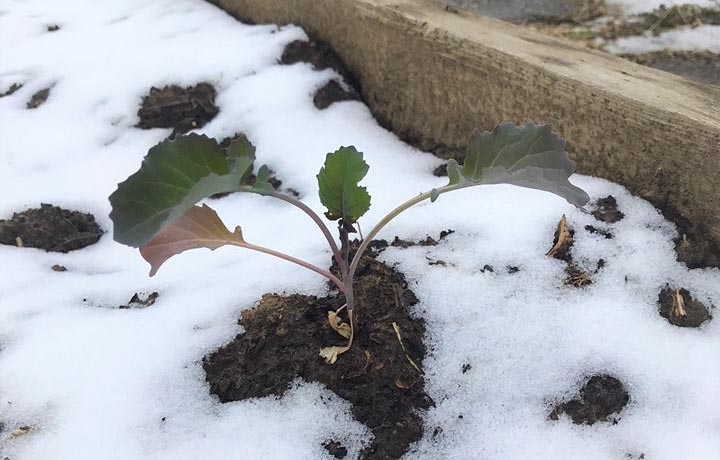Although Kansas City is no stranger to unpredictable weather, the recent drop in temperature has been an unwelcome surprise for schoolyard gardens. As much as gardeners may try to prepare for late freezes, sometimes there is little that can be done besides mulch, cover, and hope. Regardless, it is always sad to see plants damaged from the cold.
A hard freeze is when temperatures drop to 25-28 degrees or below. At this temperature, even cold-hardy vegetable plants are vulnerable to the cold. Gardeners recognize damage to their plants through discoloration in the leaves or droopiness in the stem of the plant. Leaves may turn black or brown on the edges, or have yellow, white, or red streaks down the middle.
Some vegetables are more tolerant of frost than others. Kale, collards, carrots, beets, and turnips are among the most tolerant of all vegetable crops. However, at their newly transplanted stage, even these veggies are vulnerable to the cold winds and low temperatures.
Since most seeds and potatoes will have not yet germinated in schoolyard gardens, both should be protected from the hard freeze we experienced this past week. If you do find that your young seedlings have been damaged, you can always reseed as the weather warms up.
If you notice damage on your transplants from the freeze, do not remove them unless instructed by your SYG contact. Vegetable plants are surprisingly resilient and may bounce back as the weather warms up. If another hard freeze is predicted early this spring, prepare your beds by adding 4-6 inches of straw mulch around your transplants and covering them with an old sheet or blanket. Do not use plastic to cover your garden unless you are able to remove it during the day. Otherwise, when the temperature rises, your plants will bake in the sun.
Even while taking all the necessary precautions, you may find your plants damaged this growing season. For better or worse, working with the weather is part of what makes gardening so exciting (but also so difficult)! It is always sad to see an entire crop lost, but luckily short season crops can be seeded in their place, such as radishes, lettuce, and spinach.
If you are like me, all these cold dips are extremely stressful. Here at schoolyard gardens, we’ll be excited for the weather to feel like spring again!










